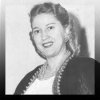The 1997-99 seasons saw Ms. Kitic was at the Essen Opera in Germany, singing the roles of Giulietta in Offenbach's "The Tales of Hoffan", Sextus in Handel's "Giulio Cesare" and "Carmen" - for which she earned the German music critic's award as "Performer Of The Season" for 1998. She later performed that role throughout Germany, Austria, The Netherlands, Belgium and Czech Republic. Other European engagements included the role of Laura in Ponchielli's "La Gioconda" at the Dorset Festival in England in 1999, Maddalena in Verdi's "Rigoletto" at the Deutsche Oper Berlin and Festspielhaus Salzburg in 2000.
During the 1998-99 season, Ms. Kitic made her US debut in the demanding role of Eboli in Verdi's "Don Carlo", with the Palm Beach Opera, under the baton of Mo. Guadagno. This inspired a return to that same opera company in season 2000, as Rosina in "Il Barbiere". The same season also marked Ms. Kitic's debut at the Carnegie Hall with New York Opera Orchestra, under the baton of Maestra Eve Queler, as Emilia in Verdi's "Othello". Incidentally, this was for the Carlo Bergonzi's farewell concert. Collaborating again with Mo. Queler and NYOO has produced a recording of famous arias for the mezzo-soprano.
2002 saw Ms. Kitic as Carmen in her very successful debut with the Washington, DC Opera, and critics and audiences praised her performance in the role of Giulietta in "Les Contes d'Hoffman" with the Los Angeles Opera. During the same season she again performed with the LA Opera at the "Concert of Passion and Poetry", conducted by Placido Domingo. The year 2003 began with her debut with the Opera Pacific as Herodias in Strauss' "Salome", for which opera company she also performed the Benefit Concert with Placido Domingo, Mo. John De Main and Opera Pacific Orchestra. Another production of Carmen with Baltimore Opera and a return to Carnegie Hall as Laura in "La Gioconda", opposite Marcello Giordani and Aprile Millo, rounded up the season.
In October 2004. Ms. Kitic won unanimous raves performing Carmen with Los Angeles Opera (opposite Richard Leech) , conducted by Placido Domingo and Nicola Luisotti. Beethoven's 9th Symphony concert with Pasadena Symphony Orchestra, followed.
2005. started out with a very successful debut in the role of Dalila in "Samson and Dalila" with the Opera Pacific. Ms. Kitic has also been proclaimed "Diva of the Year" from the Opera Pacific Guild in February 2005.
Recent engagements included the role of Meg in Verdi's "Falstaff" with the LA Opera, under the baton of Kent Nagano (May, June 2005); Emilia in Verdi's concert version of "Othello" at the Ravinia Festival, conducted by James Conlon (July 23rd, 2005), debut at the Metropolitan Opera in the title role of Carmen (October 2005.) and Amneris in Verdi's "Aida" with Opera Pacific (April 2006). Other Metropolitan engagements include the role of Laura in "La Gioconda" (October 2006), and role of Helena Bezukhova in "War and Peace" (season 2007/08) conducted by Mo. Valery Gergiev.
Ms. Kitic studies with Metropolitan and Vienna State Opera star Kammersaengerin Biserka Cvejic. Ms. Kitic also leads popular master classes at Chapman University and USC Thorton School of Music in Southern California, is often seen as a judge for the Music Center Spotlight Awards in L.A. and is enthusiastic donor for several Young Artist Programs in the United States.
The International Jeunesses Musical Competition in Belgrade, Serbia has established a special prize for "the best young Mezzo-Soprano", under the name of Milena Kitic, which is being awarded for the third time in 2008.
On April 15th '07. Ms. Kitic becomes a first Inaugural Recipient of the Artist-in-Residence Award given by The Chapman University College of Performing Arts in Orange, California and becomes their Adjunct Professor.
From January 2008. Ms. Kitic became a Board member of the Opera Pacific in Costa Mesa.





